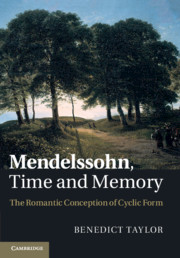6 - Cyclicism in Mendelssohn's mature music
Published online by Cambridge University Press: 05 November 2011
Summary
The years after 1829, with the composition of the E♭ Quartet, show a development away from the idea and principles of cyclical form espoused so brilliantly in these early chamber works. In fact, it is not just cyclic works which are discarded but instrumental music in general: Mendelssohn was not to complete another chamber work until eight years later, in 1837, when the Op. 44 set of quartets demonstrate a ‘new way’ – a new formal clarity and masterly handling of generic demands which has often been seen as issuing in a more classical or classicist period in Mendelssohn's music.
The reasons for this change are complex and multifaceted, and have been a stumbling block for many attempts at understanding the composer's life. Certainly, biographical factors offer some explanation for a break in Mendelssohn's life at this time which could conceivably have influenced a stylistic change in his music by the later 1830s. The years from 1829 onwards were those of Mendelssohn's travels, the famous journeys to England, Scotland and Italy, which formed the inspiration for so many of the compositions from the next years. These Wanderjahre, besides their immediate service as a formative artistic Bildung, were an opportunity for the young composer to establish contact with the leading figures of European musical life and decide on the most profitable place for his future vocation. Within a year of returning to Germany Mendelssohn had embarked upon his professional career in Düsseldorf as musical director of the town.
- Type
- Chapter
- Information
- Mendelssohn, Time and MemoryThe Romantic Conception of Cyclic Form, pp. 209 - 280Publisher: Cambridge University PressPrint publication year: 2011



